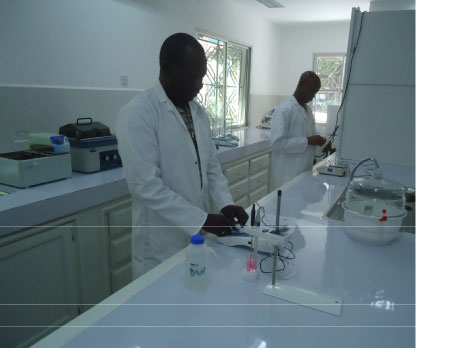
The
According to a United Nations industrial development organization official, preparations are at advanced stage.
Speaking in an exclusive interview, Professor Upali Samarajeeva, United Nations international expert in the area of laboratory accreditation, dwelt on wide range of issues, including the training and installment of some lab equipment.
Prof. Upali who has been coming to The Gambia for the past four years through UNIDO under the West Africa Quality Programme (WAQP) in relation to the work of food testing laboratories said: “UNIDO through the EU funded WAQP has been developing the laboratories progressively, starting with development of the human resource, the infrastructure, the documentation and so on. Now we have come to the stage when UNIDO has delivered the equipment for the labs.”
Prof. Upali further told this reporter that: “The purpose of my visit this time is to install the lab equipment and train the staff on the use of the equipment. So I’m almost completing that part of the job. Whilst that is going on, I have also been looking at the document prepared by the staff of the lab, discussing the test methods and so on. At the end of my mission, the lab will be ready to start with certain tests as soon as they get the re-agents for the testing which is expected within the next two to three weeks.”
Asked when The Gambia will expect the supported labs to be accredited, in response he said: “Yeah, it’s a bit of a longer process in the sense that for the labs to be accredited, they should be in a position to demonstrate their competence. So to demonstrate their competence they have to start practicing, and should be doing the testing for about six months. Also, during this period, they must operate the quality management system correctly.
He added: “So when we have all that going on well, then the lab will be in a position to apply for accreditation. Once we apply, the vetting body will want to look at our documentation, which we have to send through mail. They will go through all the documentation, and if they find that we are ready and working well, meeting the international testing standards, ISO 17025, then they would come here to check the lab. So there will be an assessment where each of these analysts, staff members of the lab, will be questioned on their in-depth knowledge of the subject and their ability to maintain a quality management system, and so on.”
“That might take another one year on the whole. However, we are trying to see whether they could finish it by December 2011. But everything depends on the practice and the way the laboratory develops. So once we achieve that, and when the accrediting officials go through the lab, they may always have to find some non-conformity which we have to clear up. And once they are cleared, the lab will get accredited. So it takes about one year.”
The UN official further noted that “one of the major problems we have in this part of the world is that, as signatories to the World Trade Organization / (WTO) Agreements, we have to fulfill certain requirements in relation to our exports to ensure the safety of the products we are exporting to the consumers in the other countries. One way of ensuring this is by testing in the labs and providing test reports. For this, we have to have our labs accredited.
He believes that once the lab is accredited then you are in the position to provide a report which is internationally accepted, adding that this is what accreditation means.
The Professor concluded by saying that if the reports are accepted certainly our fish industry will benefit, because then the European countries will be willing to buy our fish supported by reports from an accredited lab.

